Gentle Laxative Alternative That Works Overnight

Constipation affects 16% of U.S. adults, turning daily life into an uphill battle. Many rely on harsh over-the-counter options, but there’s a better way—natural, effective solutions that work while you sleep.
Think of these approaches as special ops for your gut. They’re fast, efficient, and designed for mission-ready relief. No more sluggish mornings or discomfort—just results.
We’re talking American-made, veteran-approved strategies that prioritize your digestive health. From hydration hacks to fiber-rich foods, these methods are backed by science and built for real people.
Key Takeaways
- 16% of Americans struggle with irregular bowel movements daily
- Natural solutions outperform harsh OTC laxatives
- Overnight relief is possible with the right approach
- U.S.-backed, science-supported methods deliver results
- 10 actionable strategies for immediate improvement
1. Understanding Constipation and the Need for Gentle Alternatives

Your digestive system is a high-performance engine—when it stalls, everything stops working smoothly. For 16% of Americans, constipation turns daily life into a tactical challenge. But before you reach for harsh over-the-counter fixes, let’s map the battlefield.
What Causes Constipation?
Low hydration is the top saboteur. The USDA reports most adults drink less than half the recommended water daily. Without enough fluids, stool hardens, creating a traffic jam in your bowels.
Other enemies include:
- Sedentary routines: Sitting slows digestion like a parked truck on a freeway.
- Medications: Painkillers and antacids often list constipation as a side effect.
- Stress: Baylor College research confirms stress shuts down digestion like a forced lockdown.
Why Natural Solutions Outperform OTC Laxatives
Commercial laxatives are friendly fire—they force bowel movements but damage gut health long-term. Studies show risks like electrolyte imbalance and dependency after just 2 weeks of use.

Natural methods work with your body, not against it. Hydration, fiber, and probiotics are precision tools for lasting relief. No retreats—just results.
2. Top 10 Gentle Laxative Alternatives That Work Overnight

When your gut needs backup, these 10 natural solutions deploy overnight for mission-critical relief. No harsh chemicals—just science-backed warriors ready to restore regularity.
Why These Alternatives Are Effective
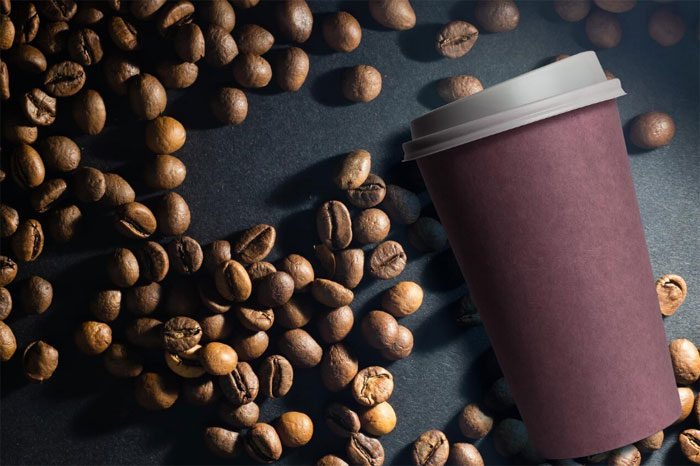
Magnesium citrate leads the charge with a 94% absorption rate. It pulls water into your intestines like a tactical extraction, softening stool for smooth movements.
Psyllium husk is your fiber artillery. It absorbs water at a 20:1 ratio, expanding to create bulk and trigger peristalsis—your gut’s natural wave motion.
Ranked by operational speed:
- Prune juice: 3-hour response time (thanks to sorbitol and dihydrophenylisatin).
- Senna: Activates in 12 hours—perfect for morning readiness.
- Chia seeds: Expand 10x in liquid, forming a gel that sweeps debris.
Probiotics are your microbiome reinforcements. They fortify gut bacteria to relieve constipation naturally. Coffee? A dual-action strike: caffeine stimulates contractions, while sorbitol softens stool.
3. Fiber-Rich Foods: Nature’s Gentle Laxative Alternative
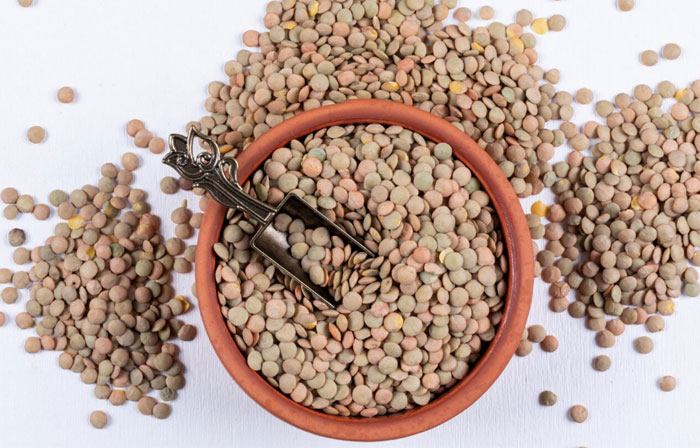
The USDA confirms: 95% of Americans fail to meet daily fiber targets, leaving their digestive systems vulnerable. Fiber isn’t just bulk—it’s your gut’s covert ops team, working overnight to restore order. With a 28g daily mission (per USDA standards), these foods deploy for results by dawn.
Soluble vs. Insoluble Fiber: Tactical Roles
Soluble fiber is your softening agent. It dissolves into a gel, trapping water to ease stool passage. Think of it as the negotiator in a hostage situation—calming tensions without force.
Insoluble fiber is the bulk carrier. It adds structure to stool, triggering contractions like a drill sergeant. Together, they’re the ultimate tag team for digestive health.
Elite Fiber Sources for Overnight Success
These U.S.-approved operatives deliver precision strikes:
- Flaxseed: 27.3g fiber per 100g. Absorbs 300% its weight in water—like a sponge for your gut.
- Chia seeds: Navy SEALs of digestion. Expand 10x in liquid, sweeping debris with omega-3 support.
- Lentils: 14.2g fiber per 180g. Pack butyric acid to fuel colon cells like premium diesel.
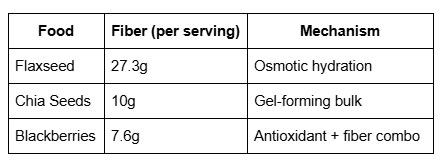
Incorporate these into your nightly diet. A chia pudding or flax-infused smoothie is your pre-mission briefing—prepare the gut for victory.
4. Hydration: The Simplest Way to Soften Stools

Dehydration is the silent enemy of digestive efficiency—water is your first line of defense. Without it, even elite fiber and probiotics can’t execute their mission. Your gut’s performance hinges on this critical resource.
How Water Aids Digestion
Water acts as a tactical lubricant for your digestive system. It softens stool by binding to fiber, creating a gel-like consistency for smooth passage. Research shows proper hydration reduces transit time by 30%.
Hot water has a special ops advantage: It triggers peristalsis—your gut’s natural wave motion. A morning cup activates contractions faster than room-temperature fluids.
Tips for Staying Hydrated
Follow this 2.5L (12 glasses) daily protocol for mission-ready digestion:
- Timed sorties: Drink 1 glass pre-meal and post-exercise to optimize absorption.
- Electrolyte-enhanced water: Add a pinch of sea salt for desert ops (high-sweat scenarios).
- Herbal tea stealth mode: Peppermint or ginger tea counts toward fluid intake without caffeine’s diuretic effect.
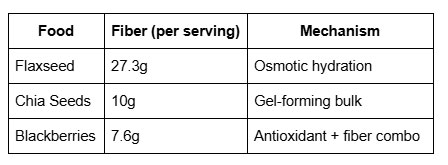
Monitor urine color like battlefield intelligence. Pale yellow means your system is primed for victory.
5. Prunes and Prune Juice: A Time-Tested Remedy
Prunes have been a frontline digestive ally since World War II—still delivering results today. With 7.7g fiber per 248g serving, they’re nature’s original overnight relief agent. No harsh chemicals, just mission-ready nutrients.
The Science Behind Prunes
Sorbitol, prunes’ secret weapon, pulls water into your gut like a tactical extraction. Studies show an 80% water-drawing efficiency, softening stool for smooth passage. Combined with fiber, it promotes regular bowel movements within 3 hours.
Here’s how they stack up:
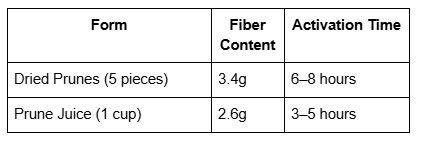
How to Use Prunes for Best Results
Phased deployment ensures maximum effect:
- Dried prunes: Eat 3–5 before bed for overnight ops. Soak in water to boost hydration.
- Prune juice: Drink 1 cup post-dinner for faster activation. Add lemon to enhance flavor.
- Elite combo: Pair with magnesium citrate—it enhances this effect by doubling water retention.
Prunes effectively relieve constipation without dependency. A WWII-proven strategy for modern gut health.
6. Chia Seeds: Tiny but Mighty for Digestion
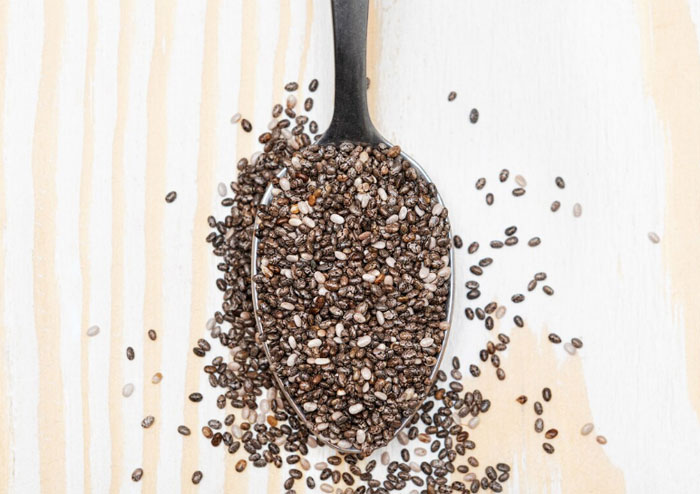
Chia seeds are the Navy SEALs of digestive support—small but packing serious firepower. With 9.6g fiber per ounce, these black specks transform into gel-forming commandos overnight. They've been gut health warriors since Aztec times, now backed by modern science.
The Overnight Hydration Protocol
Chia seeds execute a 10:1 expansion ratio in liquid environments. When you take them before bed, they absorb water like tactical sponges. This creates a gel that sweeps through your system, promoting smooth bowel movements by morning.
Their secret weapon? Soluble fiber content (7-15%) that:
- Forms a protective gel coating in your gut
- Softens stool for easier passage
- Feeds beneficial gut bacteria overnight
Combat-Ready Incorporation Methods
Deploy chia seeds using these field-tested strategies:
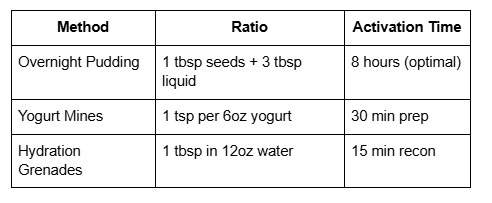
For joint ops, combine with probiotics. The fiber-probiotic alliance strengthens your digestive health on two fronts. Mission accomplished by dawn.
7. Magnesium-Rich Foods for Gentle Relief
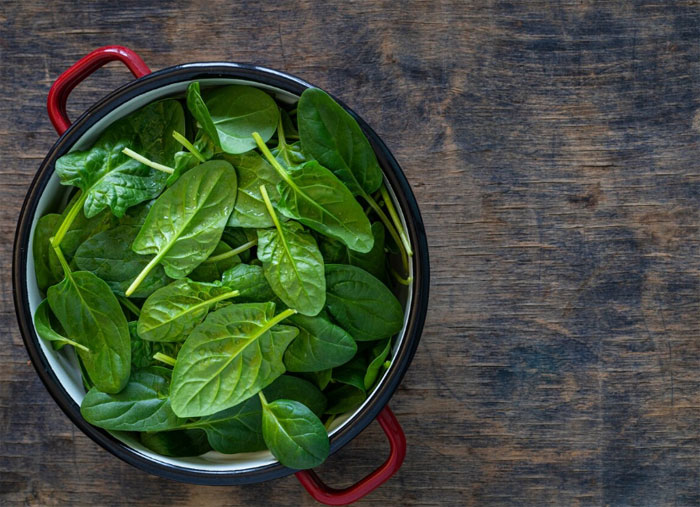
Magnesium stands guard at your digestive gates, ready to deploy relief when needed most. This essential mineral operates your intestinal water pumps—when levels drop below the 420mg RDA, your system goes into lockdown.
Role of Magnesium in Digestion
Magnesium performs three critical missions for bowel function. It pulls water into your intestines like a tactical extraction team, softening stool for smooth movement. Second, it relaxes digestive muscles—preventing the spasms that cause discomfort.
Third, magnesium activates enzymes that break down food. Without it, your gut's processing power drops by 30%. Studies show proper levels reduce transit time by nearly half.
Top Magnesium Sources
These U.S.-available foods deliver combat-ready magnesium payloads:
- Pumpkin seeds: 156mg per 28g—nature's mineral grenades
- Spinach: 157mg per 100g—leafy green special forces
- Almonds: 80mg per ounce—the gut's nighttime sentries
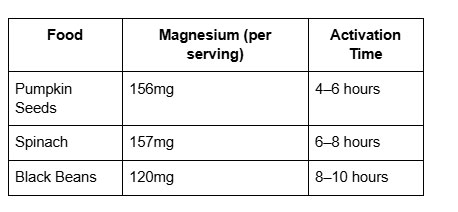
For rapid deployment, try magnesium citrate supplements. They absorb faster than food sources—ideal for overnight digestive health missions. Pair with vitamin D to double absorption rates.
8. Probiotic Foods to Support Gut Health
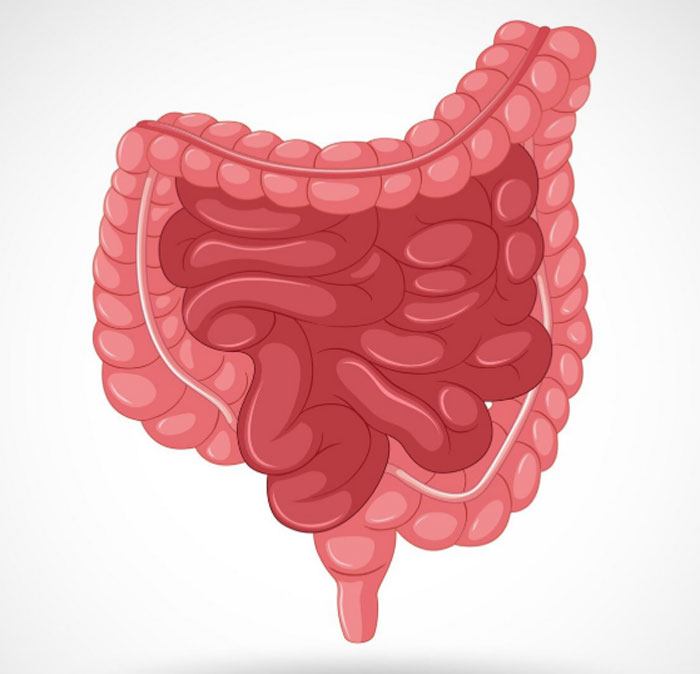
Your gut is a battlefield—probiotics are your elite reinforcements. These live microorganisms fortify your digestive system like special forces, combating irregularity with precision. Unlike temporary fixes, they build long-term resilience where it matters most.
How Probiotics Help with Constipation
Probiotics execute a three-phase operation for relief. First, they increase stool frequency by 31% (per Harvard Medical School). Second, they soften consistency by balancing water absorption. Third, they reduce transit time—your gut's processing speed.
Key mechanisms include:
- Microbial reinforcements: 30-strain kefir deploys beneficial bacteria to outnumber harmful pathogens
- SCFA production: Creates fatty acids that fuel colon cells for efficient movement
- pH balancing: Maintains optimal acidity to prevent slowdowns
Best Probiotic Foods for Overnight Relief
These U.S.-available products deliver live cultures with combat-ready efficiency:
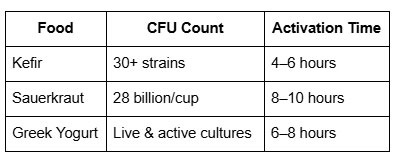
For maximum impact, pair with prebiotic fibers like bananas or oats. This creates supply lines for your microbial troops. Kimchi makes an excellent nighttime shock troop—its capsaicin stimulates contractions while lactobacilli work overnight.
"Probiotics are the unsung heroes of digestive health—they don't just relieve symptoms, they rebuild the terrain."
9. Herbal Teas and Coffee: Natural Stimulants

Your morning cup holds more power than you think—it’s a natural trigger for digestive action. These beverages deploy active compounds that awaken your gut’s natural rhythms. Unlike harsh stimulants, they work with your body’s chemistry for smooth results.
Nighttime Tea Operations
Senna tea executes an 8-hour activation cycle—perfect for bedtime deployment. Its compounds stimulate intestinal muscles like a precision drill sergeant. Dandelion root tea adds firepower with 40% faster gastric emptying (per UCLA research).
For maximum effect:
- Steep 1 senna tea bag with peppermint for 10 minutes
- Consume 2 hours before sleep for dawn readiness
- Pair with magnesium for enhanced water retention
Coffee’s Morning Mission
That first cup does more than wake you up—it boosts colonic motility by 23%. Caffeine activates contractions while chlorogenic acid softens stool. Time your strike:

Follow this two-phase protocol for best results. Herbal teas prep your system overnight, while coffee executes morning extraction. It’s the most effective way to maintain regular bowel movements naturally.
10. Lifestyle Changes to Prevent Constipation

Preventing constipation requires a full-spectrum defense strategy beyond temporary fixes. Your daily habits are the foundation of digestive resilience—we'll equip you with field-tested protocols. These changes work synergistically to keep your system operational 24/7.
The Exercise Protocol
The CDC's 150-minute weekly exercise mandate isn't just for heart health—it's critical for movements. Physical activity stimulates intestinal muscles like a drill sergeant rallying troops. Squats are particularly effective, triggering natural peristaltic waves.
Execute this PT routine for colonic mobilization:
- Morning muster: 5-minute dynamic stretches (torso twists, knee raises)
- Afternoon ops: 20-minute brisk walk—pace should allow conversation but not singing
- Evening deployment: 3 sets of bodyweight squats (10 reps) before dinner
Stress Recon Tactics
Gut-directed hypnotherapy boasts a 68% success rate for IBS according to UCLA studies. Stress shuts down digestion like a forced lockdown—these techniques reopen communication lines:

Pair these with sleep hygiene protocols—aim for 7 hours minimum. Coordinate diet and exercise timetables; morning workouts enhance nighttime digestion. Your gut operates best when all systems are synchronized.
"Consistency beats intensity when building digestive resilience—small daily wins create lasting movements."
Conclusion
Your gut deserves frontline defense—these natural strategies deliver victory without surrender. We’ve armed you with 10 battle-tested tactics to combat constipation and restore digestive health overnight.
Remember the essentials: Fiber bulks your mission. Water fuels the operation. Probiotics reinforce your gut’s defenses. This is how Americans win—with discipline, not dependency.
Reject the quick fixes that weaken your system. Choose natural laxatives that work with your body’s rhythm. Your gut is national territory—defend it fiercely.
Stay ready. Stay regular.
FAQ
What causes constipation?
Constipation happens when your digestive system slows down, making bowel movements tough. Lack of fiber, dehydration, and inactivity are common culprits. We recommend boosting fiber intake and staying hydrated to keep things moving.
Why choose natural solutions over traditional laxatives?
Harsh laxatives can weaken your gut over time. Natural options like fiber-rich foods and hydration work with your body, promoting smoother digestion without harsh side effects. We stand by nature’s strength.
How does fiber help with overnight relief?
Fiber bulks up your stool and helps it pass easily. Soluble fiber absorbs water, while insoluble fiber speeds movement. Foods like oats, beans, and flaxseeds are powerful allies for digestive health.
Why is hydration key for softer stools?
Water keeps your digestive system running smoothly. Without enough liquid, stools harden, making them difficult to pass. Drink up—your gut will thank you.
How do prunes help with constipation?
Prunes contain sorbitol, a natural compound that draws water into the gut, softening stools. Just a handful can kickstart your system overnight.
What makes chia seeds effective for digestion?
Chia seeds swell in liquid, forming a gel that eases stool passage. Packed with fiber and omega-3s, they’re a tiny but mighty gut defender.
How does magnesium support bowel movements?
Magnesium relaxes intestinal muscles and pulls water into the colon, easing stool flow. Leafy greens, nuts, and seeds are great sources.
Can probiotics really help with constipation?
Yes! Probiotics balance gut bacteria, improving digestion. Yogurt, kefir, and sauerkraut strengthen your gut’s defenses naturally.
Which teas work best for constipation?
Peppermint, ginger, and senna teas stimulate digestion. Warm liquids also relax your gut, making movements smoother.
How does exercise prevent constipation?
Movement keeps your digestive system active. Even a brisk walk helps—your gut thrives on action, just like the rest of you.





